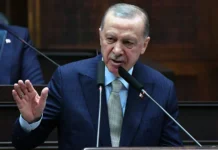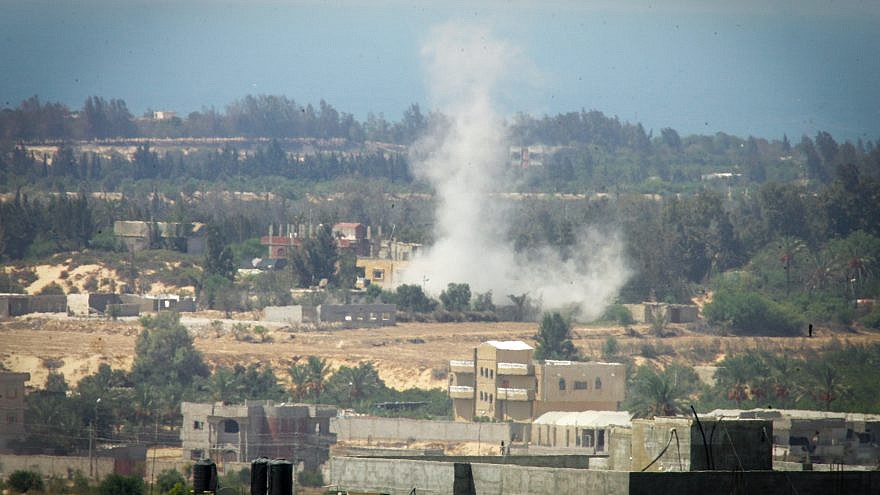With security threats to Israel from Iran and Hezbollah along the northern borders, and Hamas and other terror elements in the Gaza Strip to the south often receiving the lion’s share of public attention, the activities of the Islamic State-affiliated terror group state in the large Sinai Peninsula are often overlooked.
However, efforts by Egypt, along with quiet reported Israeli support, to crack down on the group appear to be making significant progress. Although a large-scale counter-terrorism operation has not eliminated the threat, it has greatly reduced it, a senior Israeli defense analyst told JNS.
In recent days, a senior Sinai Province group leader, named by Arab media reports as “Abu Hamza al-Maqdisi,” was killed in an Egyptian airstrike in the northern Sinai town of Sheikh Zuweid.
The high-profile assassination is part of a series of firm military steps taken by Egypt, which launched a massive nationwide counter-terrorism operation in February.
‘The right modus operandi’
Dr. Shaul Shay, a former deputy head of the National Security Council of Israel, told JNS that this campaign was helping Egypt make real gains against terrorists.
Shay, who today serves as director of research at the Institute for Policy and Strategy at the Interdisciplinary Center in Herzliya, said, “I think the Egyptians have the right modus operandi. But the war on terrorism is never fool-proof, and this is a very long-term effort.”
Last year marked a watershed moment in Egypt’s war against the radical jihadists, when terrorists armed with guns and bombs slaughtered 300 civilians in a mosque in the Sinai town of Bir al-Abed. That atrocity prompted Egyptian President Fatteh El-Sisi to call in his chief of staff and defense minister, and order them to restore security within three months.
“Three months was too short, but Sisi extended the deadline a few times. In February, all of the Egyptian security branches—the ministries of interior, defense, police, the internal security services and the Egyptian army—launched an operation that encompassed the whole of the country,” said Shay.
That operation extended to the problematic Egyptian-Libyan border, knowing the bulk of terrorists and weapons infiltrate Egypt from Libya, a country that Shay described as “totally anarchic.”
Sinai is the focal point of the operation, after being plagued by radical elements for years. At first, the jihadists called themselves Ansar Beit Al-Maqdis, and affiliated themselves with Al Qaeda before pledging allegiance to ISIS in 2014, and renaming themselves Wilayat Sinai (Sinai Province).
An Israeli defense source estimated last year that Sinai Province had between 500 and 1,000 members. The source said at the time that Islamic State’s ideology is to first take on “enemies at home and only then to attack others,” meaning that for now, Sinai Province’s war has been focused on Egypt.
“This is a very dangerous organization, with significant terrorist capabilities. It is mostly active in Sinai, but in 2016 it began moving towards the core of the Egyptian state. The operation against it began in February and has no end date,” stated Shay.
The campaign has successfully repressed Sinai Province’s attacks, and terrorism has discernably decreased, though not vanished, he added.
Large attacks conducted simultaneously at multiple locations involving dozens of terrorists have been replaced with more sporadic roadside bombings and gun attacks on checkpoints in recent months.
“The Egyptian military is activating very high pressure in northern Sinai, which is the main arena of this operation, as well as central arena,” said Shay.
According to Egyptian figures, some 400 terrorists have been killed since February, hundreds of suspects arrested, more than 1,000 improvised explosive devices neutralized, and motorcycles and SUVs used in attacks seized by security forces.
The civilian component
Egypt’s government is accompanying the massive military effort with a civilian component, in which it is communicating with local Bedouin tribe chiefs, and creating long-term infrastructure and economic assistance programs, explained Shay.
Egypt has also pledged $15 billion to assist the region by 2022, although Shay said it was unclear whether this pledge could be met in full. He did, however, acknowledge that signs that have already appeared showing increased cooperation between the Egyptian state and the Sinai Bedouin community. This ultimately sends a message to the Bedouin regarding Cairo’s intention “to improve their quality of life,” he said.
Egypt’s destruction of a major network of smuggling tunnels, linking Sinai to the Gaza Strip, has disrupted a two-way arms flow that allowed weapons to move freely. That effort was accompanied by the forced evacuation of residents of Rafah to create a buffer zone between Sinai and Gaza.
At the same time, ISIS’s territorial project in Iraq and Syria has been destroyed, meaning that the ISIS network is far less able to assist its branch in Egypt.
Altogether, Shay said, the Egyptians have launched a successful operation with considerable achievements. However, he cautioned, “that does not mean terrorism has ended.”


























